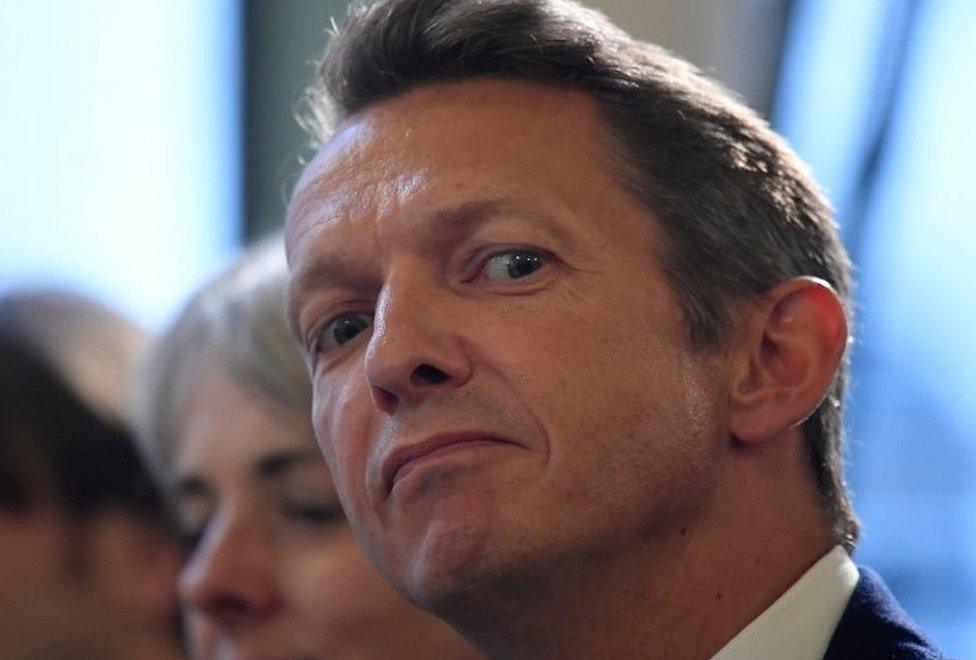Can a Nudge or two make us better savers?
- Published

A company part-owned by the UK government is looking at ways of making people put more money aside for a "rainy day".
The Behavioural Insights Team (BIT) - which uses psychological techniques known as "Nudge" theory, external to encourage good "habits" - wants more employees to sign up to payroll saving.
It is trialling an "easier-to-join" scheme on all 45,000 UK employees of consulting firm Capita, run by the tech company Level, starting later this month.
They will be able to sign up via a mobile phone, involving only a couple of clicks.
Pantelis Solomon, head of household finance at BIT, argues that currently there are "too many things that you need to do to set up an account", with take-up often around just 5% where firms offer saving schemes.
Slow systems and tedious form completion involve a "cognitive effort" that becomes a "bit of a pain", he adds.
Conversely, BIT will also look at introducing obstacles or warnings - or "soft friction" - to make leaving harder or less desirable.
This could involve requiring more clicking and form completion, or more subtle methods.
In a previous experiment, savers joining a scheme wrote a "letter" to themselves, setting out their reasons for putting money aside in the first place, such as a buffer for their family in case of redundancy.
This was sent to them when they asked to quit - the emotional effect reducing their likelihood of going.

Pictures of "targets" people want to save for - such as a home - can help keep them going
BIT - co-owned by its own employees, the Cabinet Office and the Nesta "innovation foundation" - uses Nudge theory, a branch of behavioural economics.
This is designed to get people to do the "right thing" by making it easier, more normal and more obvious.
If the Capita scheme works, it could be offered more widely over the next few years, with its backers hopeful that other large firms - and even the government, which has many contracts with Capita - could take it up.
Many households, despite sometimes high disposable incomes, live in a financially precarious position.
The Nationwide Building Society estimated in late 2019 that about 12.1 million adults in the UK had no money put aside for hard times., external Of those who did have a savings product, 24% did not put anything in it.
"In this current climate a lot of people are dipping into their savings," Mr Solomon says.
"A lot of people can't save in this environment but there's a lot of middle-income people who are just bad at handling credit. There's a lot of scope for people to save."
Interest rates are currently very low, which would appear to act as a disincentive to saving.
But Level, which is handling the software needed for the Capita-BIT scheme, promises to look for the highest level of interest available, the size of its total deposits helping it negotiate with banks.

Nudge scientists say they don't want to know whether you like to buy quinoa...

... or cider - and other beverages
Another part of the experiment involves savers sharing spending data, which will be collated and shown to them in more digestible - perhaps graphic - form.
This means "holding up a mirror" rather than "telling you how to live your life", says Stephen Holliday, Level's chief executive.
"If you ask people what they spend on food every month or what their total bills are, they have no idea", he adds.
"But it's not a difficult thing to add up and look at in a piece of data. We would see a £12 bill from Sainsbury's. Whether you spend it on quinoa or cider, we wouldn't know."
Mr Holliday thinks a 15% take-up for the Capita scheme, when it is reassessed later this year, would count as a success.
He would one day like to reach a "tipping point" where joining a work savings scheme becomes the norm.

The Bank of England's Andy Haldane says people have saved an extra £100bn during the pandemic
So could it ever get to the point that - as happens with pensions auto-enrolment - people have to opt out of, rather than into, payroll savings?
"I'd like to see wider take-up across large corporates," he says. "Government can take a lead in that, whether that's through encouragement or adoption or they make auto-enrolment easier.
"Everyone who joins the Army at 17 could sign up, for instance."
Bank of England chief economist Andy Haldane has estimated that UK households spending less on commuting, childcare and other outgoings during the pandemic have saved an extra £100bn., external
But Scott Corfe, research director at the Social Market Foundation think tank, says Covid is likely to have increased inequality, with lower-paid workers - such as those in hospitality and retail - unable to save.
They also face a greater risk of losing their job. now or when furlough ends, he argues

What is the best way to get workers of all incomes to put money aside for themselves and their children?
While he thinks the BIT-Capita-Level scheme is a good idea, Mr Corfe goes further than Mr Holliday in saying a system of auto-enrolment is "vital" to expanding take-up.
Used for UK work pensions since 2012, this technique was itself inspired by Nudge theory - but might be described as more of a "shove".
Mr Corfe says auto-enrolment could be backed up by government help - say putting in a few pence for every £1 saved - for those on the lowest incomes.
There could be restrictions on withdrawing the money for the first year - not-so-"soft" friction - so people don't use the assistance as a day-to-day benefit.
This would all probably require legislation, Mr Corfe says, which will not happen in a hurry.
The BIT-Capita-Level scheme will be closely watched in government, and by opposition parties.
And Covid - as with so much else, in policy terms - could speed things up.